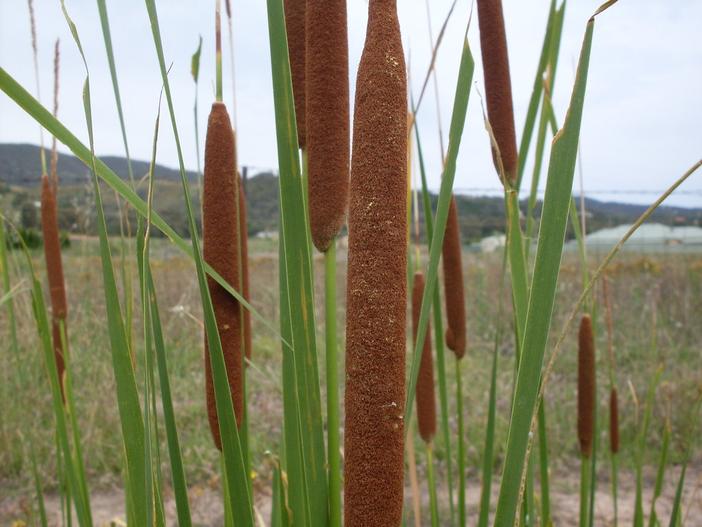Bulrush
(Typha orientalis)
Bulrush (Typha orientalis)
/
/

John Tann
CC BY 2.0
Image By:
John Tann
Recorded By:
Copyright:
CC BY 2.0
Copyright Notice:
Photo by: John Tann | License Type: CC BY 2.0 | License URL: https://creativecommons.org/licenses/by/2.0/ | Uploader: John Tann | Publisher: Flickr














































































Estimated Native Range
Summary
Typha orientalis, commonly known as bulrush, broadleaf cumbungi, or raupō, is a perennial herbaceous plant native to wetlands, marshes, and the edges of ponds and lakes in East Asia, Australia, and New Zealand. It typically grows to a height and width of 6-9 feet (1.8-2.7 meters), forming dense stands. The plant features a stout, erect stem and long, narrow leaves. During the summer months, it produces dense, brown, cylindrical flower spikes that are not particularly showy but are distinctive. The flowers are followed by fluffy seed heads that are often used in dried flower arrangements.
Typha orientalis is valued for its ability to stabilize soil and clean water by filtering pollutants, making it an excellent choice for natural water treatment systems, such as constructed wetlands. It is also used ornamentally in water gardens and ponds. This species thrives in full sun and requires aquatic conditions, meaning it needs to be grown in water or very wet soil. It is tolerant of a range of soil types as long as the soil is saturated. While it is generally easy to maintain, it can become invasive if not controlled, spreading rapidly through its rhizomes and prolific seed production. Gardeners should be cautious when introducing it to areas outside its native range, as it can outcompete native vegetation.CC BY-SA 4.0
Typha orientalis is valued for its ability to stabilize soil and clean water by filtering pollutants, making it an excellent choice for natural water treatment systems, such as constructed wetlands. It is also used ornamentally in water gardens and ponds. This species thrives in full sun and requires aquatic conditions, meaning it needs to be grown in water or very wet soil. It is tolerant of a range of soil types as long as the soil is saturated. While it is generally easy to maintain, it can become invasive if not controlled, spreading rapidly through its rhizomes and prolific seed production. Gardeners should be cautious when introducing it to areas outside its native range, as it can outcompete native vegetation.CC BY-SA 4.0
Plant Description
- Plant Type: Herb
- Height: 6-9 feet
- Width: 6-9 feet
- Growth Rate: Rapid
- Flower Color: N/A
- Flowering Season: Summer
- Leaf Retention: Evergreen
Growth Requirements
- Sun: Full Sun
- Water: Aquatic
- Drainage: Standing
Common Uses
Bird Garden, Erosion Control, Low Maintenance, Water Garden
Natural Habitat
native to wetlands, marshes, and the edges of ponds and lakes in East Asia, Australia, and New Zealand
Other Names
Common Names: Bulrush, 香蒲
Scientific Names: , Typha orientalis, Typha muelleri, Typha japonica, Typha shuttleworthii subsp. orientalis, Typha angustifolia subsp. muelleri, Typha latifolia subsp. orientalis, Typha latifolia var. orientalis, Typha orientalis subsp. brunnea, Typha orientalis var. brunnea
GBIF Accepted Name: Typha orientalis C.Presl